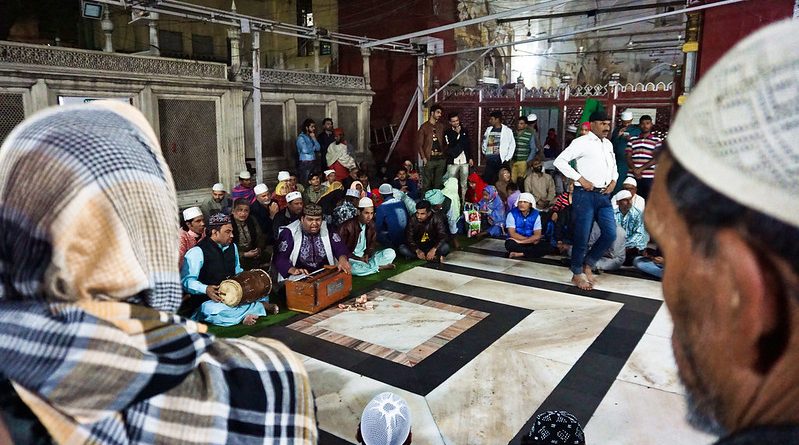Qawwali: Music of the Sufis
Culture Facts
Where: India and Pakistan
What’s it about: Spiritual Islamic song of the esoteric Sufis sect, highly improvisatory and hypnotically repetitive
Experience: Join in the Qawaali group song community in narrating Persian poetry
Hear: The West’s leading exponent: Nusrat Fateh Ali Khan
Qawwali is a form of music practiced by Sufis to inspire religious devotion and instruction. Sufism is a mystical school of Islamic thought where truth and divine love are achieved through personal experience. Sufis are synonymous with the ‘Whirling Dervishes’ found in many parts of North Africa and the Middle East. Unlike Muslims, Sufis believe that one can reach God during your own lifetime and one of qawwali’s formal names means “royal court of saints”. The Qawwali form of Islamic song is practiced in India and Pakistan.
Buried Deep: History of Qawwali
The roots of Qawwali began in the 11th Century with the tradition of sama, spiritual concerts which predate the birth of Muhammad. Shaikh Nizamuddin Auliya, a follower of the Christi school of Sufism used music extensively in his prayer gatherings, creating tension with the orthodox Islamics in Delhi. However, the godfather of Qawwali is said to be Amir Khusru from the 13th century, a legendary musician, politician and philosopher who mixed elements from Turkey, Persia and India in the creation of a new music.
In Qawwali, Persian moqquams meet Indian ragas (similar to scales in western music). Not all people were a fan of this new music. Qawwali alongside Sufism suffered a decline and repression during certain periods of Islamic history when fundamentalists attacked the liberalism of the Sufis and their ‘depraved’ experimental music. One opponent was Aurangzeb – when the musicians held a ‘funeral’ with their instruments wrapped up in corpses to signify the death of their music under his rule, the cruel emperor was reported to have said: “Good! Bury it so deep that never a sound should be heard again.”
Qawwali in the Modern Age
Qawwali achieved a recent wave of popularity in film music, where it forms one of the key components of Hindi films. Without a live audience, these pre-recorded qawwali soundtracks have a more muted and detached character, with virtuosity pumped up and devotionalism played down. Secular qawwali is often seen by its true exponents as being commercial and shallow. The rich, sensual and spiritual words are often twisted in the context of more earthly romantic cinema.
At the Qawwali Concert
Qawwali concerts are a musical gathering, containing a lead singer, second singer, harmonium and tabla and a small choir of other singers all sitting on the floor. It is a communal experience, with the audience being participators and no single person is considered to be more important, in fact, one of qawwali’s formal names means “gathering for listening”. The traditions of Persian poetry which influences qawwali have similarities here; in the 13th Century Persian poet Attar’s epic poem “conference of the birds”, a group of birds and a leader go a transformative journey. During the journey the birds realise they do not need a leader as they contain within themselves the inherent powers which the leader showed. The collective experience of Sufism and qawwali is like this, but one can only truly understand the power of qawwali if one experiences the holiness and spirituality of the form.
Qawwali players must be extremely talented musicians and poets, able to adapt to different moods of ceremonies and able to improvise in several languages in different poetic traditions. Often, qawwals are part of historic families who pass down this ‘trade’ to their offspring. Praise of saints and martyrs of Sufism as well as direct address to the Prophet are common themes in the qawwali.
During the concert, one singer will recite poetry, hand gestures and religious phrases and the second singer will create improvised call and response variations. The main singer then commands the chorus to sing a hypnotic refrain. The variation, improvisation and repetition are carried out to such an extent that the music become hypnotic and meditive, rather like the whirling of the dervishes, leading to a trance-like state. Similarities are seen here with many kind of communal music and shamanistic traditions, from voodoo to African drumming to House and Techno and the minimalist music of composers like Steve Reich. In this heightened state, the participants can achieve fana – spiritual enlightenment. The structure of each song is usually the same – it starts off with a slow ambient opening, then becomes more rhythmical and driving as the music becomes faster pulsed and more intense. It is not uncommon for members of the audience to become extremely ecstatic and throw money at the musicians. Audiences in the States even bang their heads against the wall until unconscious in more extreme manifestations of this ecstatic ritual. One legendary star of qawwal said that “the violence of the ecstasy depends on each person’s pain of seperation from his homeland”.
Qawwali Guru- Nusrat Fateh Ali Khan
The speaker was the biggest ever Qawwal star, known as ‘Pakistan’s Pavarotti’, Nusrat Fateh Ali Khan. Khan said: “When I sing for God, I feel myself in accord with God, and the house of God, Mecca, is right in front of me”.
Khan was from a family of qawwal, although he claims he only decided to follow the tradition when he had recurring dreams that he was singing where no other qawwal had sang before – in the shine of Muinuddin Christi, a founding saint of Sufism. His prophecy was later fulfilled and a glorious career ensued. Posssibly the most famous ever name in world music, Khan was one of the truly great cross over artists who was able to bridge geographical, religious and cultural divides with his powerful voice and traditions. Projects included a collaboration with Massive Attack, Eddie Vedder from Pearl Jam and Peter Gabriel. Some of his great albums were originally released on Gabriel’s Real World record label.
Khan was a huge legend, not just physically, but in his stature, he was worshipped by his fans. Unlike many singers of today, he was admired purely on his amazing vocal skills and also the passion and spirituality he displayed in his amazing improvisations. He was not afraid to mix the sacred with the profane, the popular with the niche, and a meeting of the East with the West, which has lead to his popularity and longevity. Khan died in 1997 aged just 49.
More Information
Qawwali Music: A Shamanistic Tradition?
Superb academic essay on the roots of Qawwali in Persian poetry and its relationship with shamanism.
Music
Nusrat Fateh Ali Khan: Greatest Hits, 1997 Shanachie Records
Order a copy from Amazon.com
By Susi O’Neill




